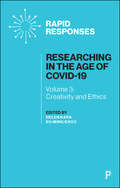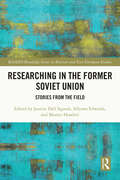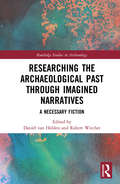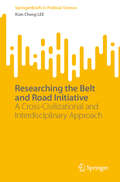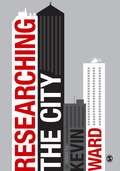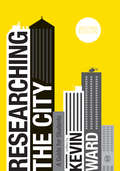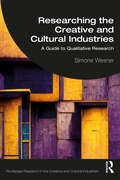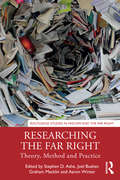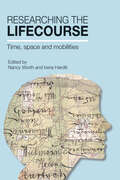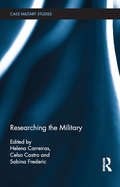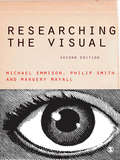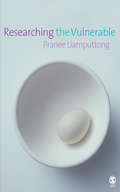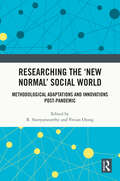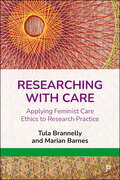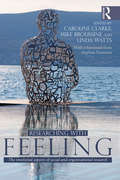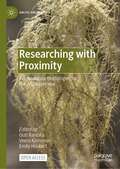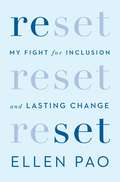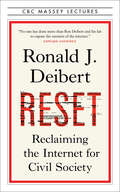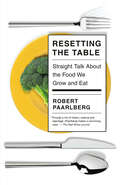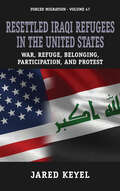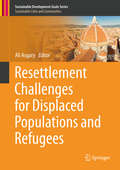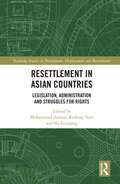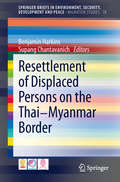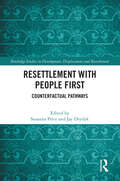- Table View
- List View
Researching in the Age of COVID-19 Vol 3: Volume III: Creativity and Ethics
by Helen Kara and Su-ming KhooAs researchers continue to adapt, conduct and design their research in the presence of COVID-19, new opportunities to connect research creativity and ethics have opened up. Researchers around the world have responded in diverse, thoughtful and creative ways –adapting data collection methods, fostering researcher and community resilience, and exploring creative research methods. This book, part of a series of three Rapid Responses, explores dimensions of creativity and ethics, highlighting their connectedness. It has three parts: the first covers creative approaches to researching. The second considers concerns around research ethics and ethics more generally, and the final part addresses different ways of approaching creativity and ethics through collaboration and co-creation. The other two books focus on Response and Reassessment, and Care and Resilience. Together they help academic, applied and practitioner-researchers worldwide adapt to the new challenges COVID-19 brings.
Researching in the Former Soviet Union: Stories from the Field (BASEES/Routledge Series on Russian and East European Studies)
by Jasmin Dall’Agnola Allyson Edwards Marnie HowlettWritten for early-career scholars still in the planning stages of their research, this book explores some of the challenges researchers face when conducting fieldwork in the former Soviet region. It addresses key questions, including: What difficulties do scholars, especially females, encounter when researching in the region? How does an early-career scholars’ positionality – especially their nationality, ethnicity, and sexuality – contribute to their experiences of inclusion, exclusion, and access while conducting fieldwork? How do early-career scholars navigate issues of personal safety in the field? How do junior academics successfully conduct high-risk research? The book includes contributors from both the region and Western countries, paying particular attention to the ways researchers’ subjectivities shape how they are received in the region, which, in turn, influence how they write about and disseminate their research. The book also explores ways to continue research away from the field through the use of digital methods when physical access is not possible.
Researching the Archaeological Past through Imagined Narratives: A Necessary Fiction (Routledge Studies in Archaeology)
by Daniël Van Helden Robert WitcherArchaeological interpretation is an imaginative act. Stratigraphy and artefacts do not tell us what the past was like; that is the task of the archaeologist. The diverse group of contributors to this volume address the relationship between archaeology and imagination through the medium of historical fiction and fictive techniques, both as consumers and as producers. The fictionalisation of archaeological research is often used to disseminate the results of scholarly or commercial archaeology projects for wider public outreach. Here, instead, the authors focus on the question of what benefits fiction and fictive techniques, as inspiration and method, can bring to the practice of archaeology itself. The contributors, a mix of archaeologists, novelists and other artists, advance a variety of theoretical arguments and examples to advance the case for the value of a reflexive engagement between archaeology and fiction. Themes include the similarities and differences in the motives and methods of archaeologists and novelists, translation, empathy, and the need to humanise the past and diversify archaeological narratives. The authors are sensitive to the epistemological and ethical issues surrounding the influence of fiction on researchers and the incorporation of fictive techniques in their work. Sometimes dismissed as distracting just-so stories, or even as dangerously relativistic narratives, the use of fictive techniques has a long history in archaeological research and examples from the scholarly literature on many varied periods and regions are considered. The volume sets out to bring together examples of these disparate applications and to focus attention on the need for explicit recognition of the problems and possibilities of such approaches, and on the value of further research about them.
Researching the Belt and Road Initiative: A Cross-Civilizational and Interdisciplinary Approach (SpringerBriefs in Political Science)
by Kian Cheng LEEThis book offers a cross-civilizational and interdisciplinary approach to the Belt and Road Initiative (BRI) research to mitigate the problematiques of extant literature. Instead of employing conventional lenses of geo-political, geo-economic and geo-strategic analyses that are predominant, this book offers fresh perspectives that venture into other civilizational and disciplinary territories while critically seeking integration without falling into romanticizing or essentializing any notions. Due to epistemic inadequacies and other conceptual limitations of existing approaches, this book argues that a heuristic framework drawing from the negotiation between Western and Chinese perspectives as well as integration of anthropological-international relations conceptualizations can provide greater potency in unravelling the intricacies of BRI studies. This book is a timely contribution to the ameliorating of the rising tensions between US and China over the recent years. An interdisciplinary toolkit for researchers in BRI-related research, as well as those in government organizations, policy-making bodies, think-tanks, trade and industry sectors, the book presents a paradigmatic shift from a predominantly hegemonic Western thinking about the BRI and its role in the region, and within academic dialogue.
Researching the City: A Guide for Students
by Kevin Ward'Extends a warm welcome to students who have come face-to-face with the daunting task of producing a dissertation. Written in an accessible and engaging style, it deals with the nitty-gritty of researching the city... a must-have for the student!' - Kim England, University of Washington 'An invaluable guide to urban research design for undergraduate and graduate students alike. It provides the novice researcher with a wealth of practical advice on theory, methods, writing style, and everything else one needs to know to design and manage a successful urban research project. I wish this book had been available when I started my research career!' - Byron Miller, University of Calgary 'Replete with tremendously useful advice and guidance for students of all social-science disciplines undertaking significant research projects on urban issues... students writing undergraduate and master's theses, or even doctoral dissertations, are likely to find it tremendously useful as well.' - David L. Imbroscio, University of Louisville This practical guide for students focuses on the city and on the different ways to research it. The authors explains how research is done, from the original idea to design and implementation, through to writing up and representation. Substantive chapters explain each method in detail, from using archival methods, interviews, ethnography, questionnaires, discourse analysis and diaries, to using GIS and visual methods. With real world examples throughout and guided further reading for each chapter, it is an inspiring guide for students carrying out their own research in urban geography, urban planning, urban studies and urban sociology courses.
Researching the City: A Guide for Students
by Kevin WardThis practical guide for students focuses on the city and on the different ways to research it. The authors explain how urban studies research is done, from the original idea to design and implementation, through to writing up and representation. Substantive chapters explain each method in detail, from using archival methods, interviews, ethnography, questionnaires, discourse analysis and diaries, to using GIS and visual methods. This second edition offers: · A thorough introduction to the research process · Revised and updated discussions of foundational methods · A new chapter on sensory methods · A new chapter on social media as an object or a method of studying the city. With real world examples throughout and guided further reading for each chapter, it is an inspiring guide for students carrying out their own research in urban geography, urban planning, urban sociology and urban studies.
Researching the City: A Guide for Students
by Kevin WardThis practical guide for students focuses on the city and on the different ways to research it. The authors explain how urban studies research is done, from the original idea to design and implementation, through to writing up and representation. Substantive chapters explain each method in detail, from using archival methods, interviews, ethnography, questionnaires, discourse analysis and diaries, to using GIS and visual methods. This second edition offers: · A thorough introduction to the research process · Revised and updated discussions of foundational methods · A new chapter on sensory methods · A new chapter on social media as an object or a method of studying the city. With real world examples throughout and guided further reading for each chapter, it is an inspiring guide for students carrying out their own research in urban geography, urban planning, urban sociology and urban studies.
Researching the Creative and Cultural Industries: A Guide to Qualitative Research (Routledge Research in the Creative and Cultural Industries)
by Simone WesnerResearch into creative and cultural organisations has proliferated, benefitting from insights from a range of disciplinary perspectives. Starting a research journey can be daunting in such a diverse field. This book provides expert insights into research process and practice, with a qualitative focus.The book helps readers to plan, execute, and analyse research, turning their work into data, results, and new knowledge. Taking an individual perspective, the author addresses a trio of paradigms, methodologies, and methods, and applies them to the whole research process, from start to finish. The book seamlessly links theoretical and conceptual aspects with best research practice along the way.A book for researchers at all stages of their work, the resources are also valuable for students and reflective cultural practitioners who want to know how to plan, implement, and evaluate their research project.
Researching the Far Right: Theory, Method and Practice (Routledge Studies in Fascism and the Far Right)
by Edited by Stephen D. Ashe, Joel Busher, Graham Macklin and Aaron WinterResearching the Far Right brings together researchers from across the humanities and social sciences to provide much needed discussion about the methodological, ethical, political, personal, practical and professional issues and challenges that arise when researching far right parties, their electoral support, and far right protest movements.Drawing on original research focussing mainly on Europe and North America over the last 30 years, this volume explores in detail the opportunities and challenges associated with using ethnographic, interview-based, quantitative and online research methods to study the far right. These reflections are set within a wider discussion of the evolution of far right studies from a variety of disciplinary viewpoints within the humanities or the social sciences, tracing the key developments and debates that shape the field today. This volume will be essential reading for students and scholars with an interest in understanding the many manifestations of the far right and cognate movements today. It also offers insight and reflection that is likely to be valuable for a wider range of students and scholars across the humanities and social sciences who are carrying out work of an ethically, politically, personally, practically and professionally challenging nature.
Researching the Lifecourse: Critical Reflections from the Social Sciences
by Edited by Nancy Worth and Irene HardillThe lifecourse perspective continues to be an important subject in the social sciences. Researching the Lifecourse offers a distinctive approach in that it truly covers the lifecourse (childhood, adulthood and older age), focusing on innovative methods and case study examples from a variety of European and North American contexts. This original approach connects theory and practice from across the social sciences by situating methodology and research design within relevant conceptual frameworks. This diverse collection features methods that are linked to questions of time, space and mobilities while providing practitioners with practical detail in each chapter.
Researching the Military (Cass Military Studies)
by Helena Carreiras Celso Castro Sabina FredericResearching the Military focuses on the experiences of researchers who study the military around the world. It explores the historical, social, institutional and personal factors that frame research and scrutinize the way knowledge in this area impacts society and policy. More than merely analyzing research experiences (yet necessarily including them), it is also about the experiences of researchers, their position with regard to the object of their studies, the institutional context where they work and the way their research impacts the academic and policy-making fields in the respective countries. The common theme to the various chapters is reflexivity, a conscious effort at addressing the conditions of research and the position of the researcher and the research participants in that interface. By collecting diverse experiences of researchers from across the world, this volume aims to enhance reflexivity in the field of military studies and to encourage the exchange of knowledge between the academic field and the military arena. This book will be of much interest to students of military studies, research methods, sociology, social anthropology and security studies, in general.
Researching the Visual: Images, Objects, Contexts And Interactions In Social And Cultural Inquiry (Introducing Qualitative Methods)
by Dr Philip D Smith Margery Mayall Michael EmmisonThis second edition provides an excellent overview of the field by covering the traditional themes and current trends in image centred photographic visual inquiry but extends this by demonstrating the rich possibilities available through the analysis of everyday objects, places and interactions. The book includes chapters on researching 2D and 3D visual data, along with lived and living visual data, and also features a brand new chapter on researching the virtual world of the internet. Drawing on theoretical traditions as diverse as semiotics, ethnomethodology, symbolic interactionism and material culture studies, the second edition provides an invaluable guide for researchers interested in conducting innovative visual inquiry. Packed with exercises and projects, the book makes it easy for students to undertake their own research with limited resources and budget. The new edition also features helpful icons alerting researchers to important ethical considerations that are vital in the field of visual research. Generously illustrated with images and diagrams, this new edition is the perfect companion to those doing projects, dissertations or theses involving visual research.
Researching the Vulnerable: A Guide to Sensitive Research Methods
by Pranee Liamputtong'This book is refreshing, both as an addition to the general literature and as a text that considers cultural and social issues in studies relating to improving the situation of vulnerable people.... [T]his book will be a helpful, accessible and interesting resource for novice and experienced researchers alike in a number of fields' - Nurse Researcher 'Pranee Liamputtong has offered a well organized, clear and accessible work in Researching the Vulnerable...this book can offer very good guidance to the postgraduate student who is willing to focus in qualitative research methods, but also to an experienced researcher who may consider testing out its procedures or eventually is attempting to put into practice innovative qualitative research procedures' - Sociological Research Online Researching Vunerable People takes as its starting point the particular considerations and sensitivities of being a researcher faced with a subject group at the margins of society, and explores the ethical, practical and methodological implications of working with such groups. Pranee Liamputtong is an experienced textbook author, and in this book she attempts to explore qualitative methods using examples, drawn from around the world, from the wide variety of contexts that might count as 'researching the vulnerable'. Numerous salient points for the conduct of research within vulnerable groups of people, including ethical and moral issues, are considered, and discussed in the context of sensitive and innovative research methods.
Researching the ‘New Normal’ Social World: Methodological Adaptations and Innovations Post-Pandemic
by R. Sooryamoorthy Vivian OjongThis edited volume focuses on the changing research methodologies in social science research, prompted by the new social world shaped by the pandemic. It explores adaptations and developments to meet the demands of transforming social circumstances and showcases innovative alternative approaches. Featuring a range of international and interdisciplinary contributors who discuss the context of social science research in the "new normal", the book sets out the need to redesign research to address present-day challenges for the post-pandemic. Chapters share methodological innovations and demonstrate how applicable these new and adapted methodologies are to a world post-pandemic, discussing a wide range of innovative, digital-first research methods with practical analysis. The role of technology and its application in social science research during this transition is explored in particular, alongside new approaches to quantitative and qualitative research that feature innovations in ethnography, online data collection, and ethical protocols for research. Ultimately offering a comprehensive exploration of adaptive and innovative social science research methodologies suited to the current social context, the book will be relevant to researchers, academics, and scholars in the fields of research methods, research technologies, and the sociology of education.
Researching with Care: Applying Feminist Care Ethics to Research Practice
by Marian Barnes Tula BrannellyWhat are the implications of caring about the things we research? How does that affect how we research, who we research with and what we do with our results? Proposing what Joan C. Tronto has called a ‘paradigm shift’ in research thinking, this book invites researchers across disciplines and fields of study to do research that thinks and acts with care. The authors draw on their own and others’ experiences of researching, the troubles they encounter and the opportunities generated when research is approached as a caring practice. Care ethics provides a guide, from starting out, designing and conducting projects to thinking about research legacies. It offers a way in which research can help repair harms and promote justice.
Researching with Feeling: The Emotional Aspects of Social and Organizational Research
by Caroline Clarke Mike Broussine Linda WattsWhy should researchers be interested in their feelings and emotions as they carry out research? Emotion is what it is to exist, to be human, and is present in every sphere of our lives. All activities are infused with emotion, even those that are constructed as ‘rational’, because rationality and emotionality are interpenetrated and entwined because all thinking is tinged with feeling, and all feeling is tinged with thinking. This book illuminates the emotional processes of doing social and organizational research, and the implications of this for the outcomes of research. With contributions from leading academics and research practitioners, it addresses the significant issue of the sometimes intense emotional experiences involved in doing research and the implications it has for the theory and practice of social research. By examining the nature of feelings and emotions, it explores how we might understand researchers’ emotions and experiences, and considers the often powerful feelings encountered in a variety of research contexts. Topics discussed include: power relations; psycho-social explanations of researcher emotions; paradoxical relations with research participants and the sometimes disturbing data that is gained; research supervision; the politics of research; gender; publishing, undergoing vivas and presenting at conferences. This book will therefore be a valuable companion to researchers and research students from the start of their career onwards.
Researching with Proximity: Relational methodologies for the Anthropocene (Arctic Encounters)
by Emily Höckert Outi Rantala Veera KinnunenThis open access book presents a series of speculative, experimental modes of inquiry in the present times of environmental damage that have come to be known as the age of the Anthropocene. Throughout the book authors develop more nuanced ways of engaging with the environmentally vulnerable Arctic. They counter distancing, exoticising, and even apocalyptic imaginaries of the Arctic by staying proximate with mundane places and beings of the north. The volume engages and plays with familiar tourism concepts, such as hospitality, visiting, difference, care, openness, and distance, while expanding the focus from binary and human-centric approaches of hosts and guests to questions of wellbeing among multispecies communities. The transdisciplinary group of contributors share a curiosity about how staying proximate may provide theoretical depth and epistemological openings to attend to current tensions and to diversify the ways we do and enact research. Thus, each chapter provides a methodological experiment with proximity, developing diverse ways of envisioning and storying more-than-human worlds.
Reset: My Fight For Inclusion And Lasting Change
by Ellen PaoThe “necessary and incisive” (Roxane Gay) account of the discrimination case that “has blown open a conversation about the status of women” in the workplace (The New York Times)LONGLISTED FOR THE 2017 FINANCIAL TIMES AND MCKINSEY BUSINESS BOOK OF THE YEAR | NAMED A BEST FALL BOOK BY ELLE AND BUSTLE In 2015, Ellen K. Pao sued a powerhouse Silicon Valley venture capital firm, calling out workplace discrimination and retaliation against women and other underrepresented groups. Her suit rocked the tech world—and exposed its toxic culture and its homogeneity. Her message overcame negative PR attacks that took aim at her professional conduct and her personal life, and she won widespread public support—Time hailed her as “the face of change.” Though Pao lost her suit, she revolutionized the conversation at tech offices, in the media, and around the world. In Reset, she tells her full story for the first time. The daughter of immigrants, Pao was taught that through hard work she could achieve her dreams. She earned multiple Ivy League degrees, worked at top startups, and in 2005 was recruited by Kleiner Perkins, arguably the world’s leading venture capital firm at the time. In many ways, she did everything right, and yet she and other women and people of color were excluded from success—cut out of decisive meetings and email discussions, uninvited to CEO dinners and lavish networking trips, and had their work undercut or appropriated by male executives. It was time for a system reset. After Kleiner, Pao became CEO of reddit, where she took forceful action to change the status quo for the company and its product. She banned revenge porn and unauthorized nude photos—an action other large media sites later followed—and shut down parts of reddit over online harassment. She and seven other women tech leaders formed Project Include, an award-winning nonprofit for accelerating diversity and inclusion in tech. In her book, Pao shines a light on troubling issues that plague today’s workplace and lays out practical, inspiring, and achievable goals for a better future. Ellen K. Pao’s Reset is a rallying cry—the story of a whistleblower who aims to empower everyone struggling to be heard, in Silicon Valley and beyond.Praise for Reset“Necessary and incisive . . . As Ellen Pao detailed her experiences, while also communicating her passion for the work men often impeded her from doing, I was nothing short of infuriated. It was great to see a highly accomplished woman of color speaking out like this, and hopefully this book will encourage more women to come forward, give voice to their experiences in the workplace, and contribute to meaningful change.”—Roxane Gay“When women assert ourselves, we confirm the bias against us, unconscious and otherwise. When we speak out, we identify ourselves as troublemakers. This is why I look forward to reading Ellen Pao’s account of her tribulations in Silicon Valley.”—Catherine Mayer, New York Times“[Ellen Pao’s] bravery in filing the lawsuit made her a hero to many women and helped change the conversation around sexism in tech. Now, Pao is back . . . with a new book, Reset, which takes readers behind the scenes of the roller coaster she’s been on.”—Marie Claire
Reset: Reclaiming the Internet for Civil Society
by Ronald DeibertIn the 2020 CBC Massey Lectures, bestselling author and renowned technology and security expert Ronald J. Deibert exposes the disturbing influence and impact of the internet on politics, the economy, the environment, and humanity. Digital technologies have given rise to a new machine-based civilization that is increasingly linked to a growing number of social and political maladies. Accountability is weak and insecurity is endemic, creating disturbing opportunities for exploitation. Drawing from the cutting-edge research of the Citizen Lab, the world-renowned digital security research group which he founded and directs, Ronald J. Deibert exposes the impacts of this communications ecosystem on civil society. He tracks a mostly unregulated surveillance industry, innovations in technologies of remote control, superpower policing practices, dark PR firms, and highly profitable hack-for-hire services feeding off rivers of poorly secured personal data. Deibert also unearths how dependence on social media and its expanding universe of consumer electronics creates immense pressure on the natural environment. In order to combat authoritarian practices, environmental degradation, and rampant electronic consumerism, he urges restraints on tech platforms and governments to reclaim the internet for civil society.
Resetting the Table: Straight Talk About the Food We Grow and Eat
by Robert PaarlbergA bold, science-based corrective to the groundswell of misinformation about food and how it's produced, examining in detail local and organic food, food companies, nutrition labeling, ethical treatment of animals, environmental impact, and every other aspect from farm to tableConsumers want to know more about their food--including the farm from which it came, the chemicals used in its production, its nutritional value, how the animals were treated, and the costs to the environment. They are being told that buying organic foods, unprocessed and sourced from small local farms, is the most healthful and sustainable option. Now, Robert Paarlberg reviews the evidence and finds abundant reason to disagree. He delineates the ways in which global food markets have in fact improved our diet, and how "industrial" farming has recently turned green, thanks to GPS-guided precision methods that cut energy use and chemical pollution. He makes clear that America's serious obesity crisis does not come from farms, or from food deserts, but instead from "food swamps" created by food companies, retailers, and restaurant chains. And he explains how, though animal welfare is lagging behind, progress can be made through continued advocacy, more progressive regulations, and perhaps plant-based imitation meat. He finds solutions that can make sense for farmers and consumers alike and provides a road map through the rapidly changing worlds of food and farming, laying out a practical path to bring the two together.
Resettled Iraqi Refugees in the United States: War, Refuge, Belonging, Participation, and Protest (Forced Migration #47)
by Jared KeyelThe American war against Iraq has caused hundreds of thousands of deaths and displaced millions of people. Between 20 March 2003 and 30 September 2017, more than 172,000 Iraqis resettled in the United States. This book explores the experiences of fifteen Iraqis who resettled in the US after 2003. It examines the long war against Iraq that began in 1991 and the decisions some Iraqis made to leave their homes and seek refuge in the United States. The book also delves into the possibilities for belonging and cultural exchange for this cohort of Iraqis and their political engagement with non-profit organizations, advocacy, and activism against the 2017 Travel Ban.
Resettlement Challenges for Displaced Populations and Refugees (Sustainable Development Goals Series)
by Ali AsgaryThe main focus of this book is to help better understand the multidimensionality and complexity of population displacement and the role that reconstruction and recovery knowledge and practice play in this regard. According to the UN Refugee Agency (UNHCR), the total number of people forcibly displaced due to wars and conflicts, disasters, and climate change worldwide, exceeded 66 million in 2016. Many of these displaced populations may never be able to go back and rebuild their houses, communities, and businesses.This text brings together recovery and reconstruction professionals, researchers, and policy makers to examine how displaced populations can rebuild their lives in new locations and recover from disasters that have impacted their livelihoods, and communities. This book provides readers with an understanding of how disaster recovery and reconstruction knowledge and practice can contribute to the recovery and reconstruction of displaced and refugee populations. This book will appeal to students, researchers, and professionals working in the field.
Resettlement in Asian Countries: Legislation, Administration and Struggles for Rights (Routledge Studies in Development, Displacement and Resettlement)
by Mohammad Zaman Reshmy Nair Shi GuoqingThis book examines land acquisition and resettlement experience in Asian countries, where nearly two-thirds of the world’s development-induced displacement currently takes place. Faced with the complexity of balancing legal frameworks and resettlement needs, along with increasing demands for safeguarding displaced peoples, in recent years many countries within Asia have adopted integrated land and resettlement laws. This book presents a comparative review and assessment of the impact of the new land and resettlement laws and regulatory frameworks for expropriation, compensation and resettlement. Written by an international, interdisciplinary team of experts from both practice and academia, the book demonstrates the ongoing challenges and struggles associated with social and resettlement risk assessments, the social and cultural exclusion of indigenous/vulnerable groups in some countries, and the lack of institutional capacity to adequately deal with resettlement management and administration. The case studies and comparative analyses of laws and practices relating to expropriation, compensation and resettlement make significant contributions to advancing resettlement knowledge and management practices. The book will be useful as a reference for development practitioners and for researchers across the fields of global development, political science, Asian studies, planning and law. The book also has potential use as a resource for resettlement management training programs and graduatelevel courses/seminars in development studies.
Resettlement of Displaced Persons on the Thai-Myanmar Border
by Benjamin Harkins Supang ChantavanichThis book is one of four volumes on a major empirical migration study by leading Thai migration specialists from Chulalongkorn University (Bangkok) for the United Nations Development Programme (UNDP). The camps on the Thai-Myanmar border are the result of the world's largest resettlement program. However, despite large-scale financial and human resource engagement, little research exists on how successful this resettlement has been. This book provides the first insight on how realistic the policy recommendations are for a durable solution for refugees at the borders. Practitioners and policymakers from governments, international organizations and NGOs will benefit from its findings. The volume is also helpful for anyone studying forced migration and its denouement in the age of globalization.
Resettlement with People First: Counterfactual Pathways (Routledge Studies in Development, Displacement and Resettlement)
by Jay DrydykShould people in the way lose out as new reservoirs, mines, plantations, or superhighways displace them from their homes and livelihoods? What if the process of resettlement were made accountable to those impacted, empowering them to achieve just outcomes and to share in the benefits of development projects? This book seeks to answer these questions, putting forward powerful counterfactual case studies to assess what problems real-world development projects would likely have avoided if the project had included the affected people in decision making about whether and how they should resettle. Drawing on contributions from leading and emerging scholars from around the world, this book considers cases involving dams, mines, roads, and housing, amongst others, from Asia, Africa, and South America. In each case, the counterfactual approach invites us to reconsider how the dynamics of accountability play out through resettlement hazards and the asymmetries of power relations in the negotiation of displacement benefits and redress. Considering a range of theoretical and ethical perspectives, the book concludes with practical, alternative policy suggestions for displacement arising both from development and from slow onset climate change. This book’s novel approach focussing on the people's agency in the dynamics of governance, accountability, and (dis)empowerment in development projects with displacement and resettlement will appeal to academic researchers, development practitioners, and policymakers.
